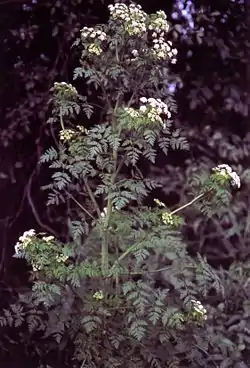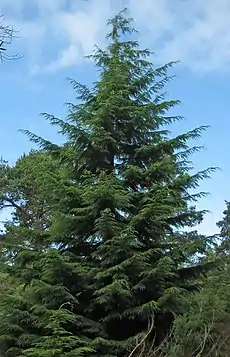hemlock
English

Conium maculatum, one of the umbellifers called hemlock

Tsuga heterophylla, one of the conifers called hemlock
Etymology
From Middle English hemlok, hemeluc, from Old English hemlīc, hymlīc m and hymlīce f (“hemlock, bryony, convolvulus”), of uncertain origin.
speculative etymology
Compare Old English hymele (“hop-vine, hops”), Old English humele (“bryony, widerton, hair moss, gold-hair, morning glory”), Danish and Swedish humle (“hops”), Icelandic humall (“hops”). Perhaps from Scythian, from Proto-Iranian *háwHmah (“ephedra; juice”), from Proto-Indo-Iranian *sáwHmas from Proto-Indo-European *sewh₁- (“to press out, extract”).
- cognates
- (from Sarmato-Scythian *haumala) Ossetian хумӕллӕг (xumællæg, “hops”)
- (from Sarmato-Scythian *hauma) Avestan 𐬵𐬀𐬊𐬨𐬀 (haoma), Baluchi [script needed] (hum), Persian هوم (hôm))
- (from Proto-Indo-Iranian *sauma) Sanskrit सोम (soma))
More at suck.
Pronunciation
- IPA(key): /ˈhɛmˌlɒk/
Audio (US) (file) Audio (CAN) (file)
Noun
hemlock (countable and uncountable, plural hemlocks)
- Any of the poisonous umbelliferous plants, of the genera
- Conium, either Conium maculatum or Conium chaerophylloides.
- 1940, Rosetta E. Clarkson, Green Enchantments: The Magic Spell of Gardens, The Macmillan Company, page 273:
- Have a tree or two the witches particularly like, such as the alder, larch, cypress and hemlock; then, to counteract any possible evil effects, there must be a holly, yew, hazel, elder, mountain ash or juniper.
- 1971, Richard Carpenter, Catweazle and the Magic Zodiac, Harmondsworth: Puffin Books, page 41:
- There were bunches of wild garlic to keep out evil spirits, foxgloves for healing spells and hemlock and vervain for darker magic.
- Cicuta, water hemlock plant.
- Conium, either Conium maculatum or Conium chaerophylloides.
- The poison obtained from these Conium and Cicuta plants. [from c. 1600]
- Any of several coniferous trees, of the genus Tsuga, that grow in North America; the wood of such trees. [from 1670]
- 2018, Richard Powers, The Overstory, Vintage (2019), page 380:
- The wind blows and the hemlocks wave their feathery leading shoots. Such a graceful profile, so elegant a tree.
Synonyms
Derived terms
- eastern hemlock (Tsuga canadensis)
- Canadian hemlock (Tsuga canadensis)
- Carolina hemlock (Tsuga caroliniana)
- Taiwan hemlock, Chinese hemlock (Tsuga chinensis)
- northern Japanese hemlock (Tsuga diversifolia)
- Himalayan hemlock (Tsuga dumosa)
- Forrest's hemlock (Tsuga forrestii)
- western hemlock (Tsuga heterophylla)
- southern Japanese hemlock (Tsuga sieboldii)
- mountain hemlock (Tsuga mertensiana)
- poison hemlock (Conium maculatum)
- hemlock woolly adelgid (Adelges tsugae)
- hemlock water parsnip (Sium suave)
- gosh all hemlock (an interjection)
- hemlock leather
- hemlock parsley
- Patton's hemlock
Translations
poisonous plant of genus Conium
|
poisonous plant of genus Cicuta — see cowbane
poison
|
tree
|
This article is issued from Wiktionary. The text is licensed under Creative Commons - Attribution - Sharealike. Additional terms may apply for the media files.